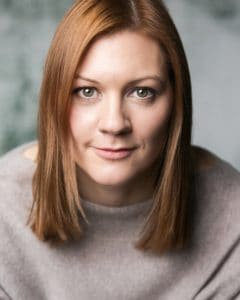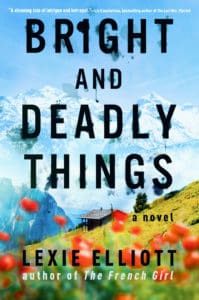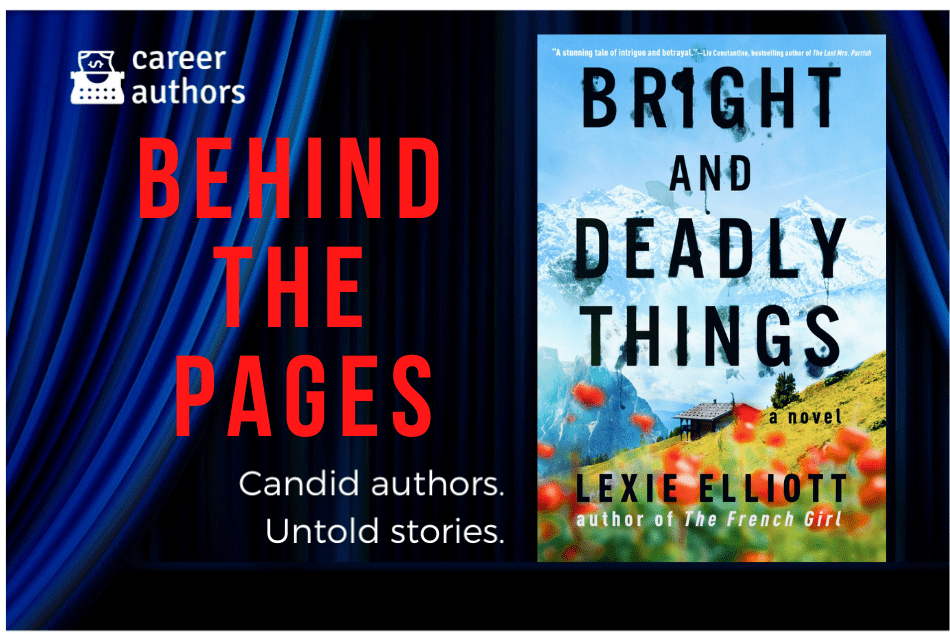One of the things I always say–as my friends and students will attest–is that you never know what’s good or what’s bad until later. Sometimes what feels like a crushing defeat will turn out to be the best thing that ever happened to you. You simply won’t know it right away. When Lexie Elliott lost her snazzy banking job in the financial crisis, she did something she’d always wanted to do. Write a bestseller. And then–she did it again. And again. Here’s what Behind the Pages of Bright and Deadly Things and then, in her bio, her amazing life. We at Career Authors are always fascinated by these interviews–they’re revealing, and educational, and always inspirational
What’s the title of your book—and was that always the title?
The title is Bright and Deadly Things, and yes, that was always the title. My first two novels (The French Girl, and The Missing Years) had different titles when I was developing them, so I’m perfectly comfortable with the idea that a working title might be jettisoned by the end of the process, but this one stuck. I particularly like the ambiguity of the word bright in that title—bright in what way? Intellectually, socially or simply in terms of absolute luminosity? And what are the things that bright is describing?
Who’s the main character of your book—and was that always their name?
The main character is Dr Emily Rivers, and yes, that was always her name. She’s a research fellow at Oxford University, in the department of Theoretical Physics. My characters’ names rarely change—in fact, I can’t think of a single instance where a significant character has had a name change. Getting each character’s name ‘right’ is something I feel I have to do before I even start describing their role in the story in my initial outline. Names are so important, and should tell the reader something about the character; for example, a Bill is very different to a William, and a Cat is very different to a Catriona.
At the start of the book, what’s the character’s goal?
At the start of the book, Emily has been recently widowed, and is searching for a way to pull herself out of the rut of grief that she has been floundering in. She accepts an invitation to join a mixed group of undergraduates, graduates and faculty staff for an academic retreat at a rustic chalet in the French Alps for a week in the summer, recognizing that a change of scene might be just what she needs. As events unfold, she finds herself with new goals and motivations, but initially—and continuously through the novel—finding a way to properly live again, despite her grief, is her main driving force.
What was the core idea for this novel—a plot point? a theme?—and where did it come from?
When I was working on my doctorate at Oxford University, I was fortunate enough to receive an invitation to join an academic party at a rustic chalet in the French Alps (I expect you can see where this is going…). The chalet is owned by three Oxford colleges, and each of them holds invitation-only reading parties during the summer. I’m happy to say that my week-long visit was delightful—certainly nobody died and everybody got along wonderfully!—but the unique experience stuck in my mind. That was the year 2000; many years later, after completing How To Kill Your Best Friend, I began mulling over setting a novel in the world of academia, but I wanted to do something a little different to a campus-based thriller, and I also wanted to introduce a “locked room” aspect to the novel. Memories of the chalet bubbled up in my mind and it just seemed to fit the criteria perfectly. I have particularly strong memories of the chalet at night, which had a distinctive atmosphere that I hope I’ve managed to give readers a taste of in the novel.
Once I had the setting, the reading party dynamics provided a really interesting landscape in which to play with the characters’ motivations. It’s not often that undergraduates, graduates and staff are thrown together in such close confines; whilst they are all part of the same university community, they each have different concerns and ambitions and worries. The university environment is different for each strata of its community, and that was a fascinating angle to consider; it certainly provided fertile ground for a thriller writer!
At what point did you come up with the final version of the first line? What is it?
The first line is “There’s someone in the house.” It’s following by a paragraph break for emphasis. That sentence was the very first thing I wrote, and it never changed. That’s usually the case with my novels: I have a great deal of clarity on the opening scene—even down to the precise detail of the first line—and also on the endpoint, but how to get from the former to the latter is usually a little more fuzzy!
Did you know the ending of the book when you started?
I knew the ending in the sense that I knew who had done what, and why, and I knew what the very last scene would be, but something rather important befalls the chalet party in the last third of the novel that absolutely did not exist in my initial outline. To me, it seems nothing short of magic when your tale takes an unanticipated turn, or your characters up and do something you hadn’t envisaged; that’s when you know the story is truly living and breathing. It’s genuinely exhilarating when that happens.
What’s something in this book that you’ve never done before?
Although the novel is written from Emily’s point of view, there are some short diary entries sprinkled throughout, which are penned by other characters. I hadn’t ever had to manage more than two voices in a novel (How To Kill Your Best Friend had a dual narrative) so I had to work quite hard to make each entry distinct whilst also ensuring that those sections served the purpose of pushing the story along. Ultimately, I’m very pleased with how that turned out, but it definitely required a lot of thought, and a certain amount of reworking!
What part of your tour (or launch week) are you most excited about?
I particularly enjoy live interviews—be they radio or podcast or book festivals or social media live events—and therefore those are what I’m most excited about. Writing is an incredibly solitary occupation, so having the opportunity to interact with anyone who has a genuine interest in books is a really enjoyable experience for me. Events where the audience can post questions in real time can be a little nerve-wracking, as you never know what might crop up, but that’s part of the fun—it keeps you on your toes! I would write even if nobody read anything I produced, but it’s incredibly rewarding—and very humbling—to interact with people who have read my books and are excited to talk about them.
Who in your #writingcommunity deserves a special shout-out for supporting you in writing this story? Why?
My agent. It’s always my agent, the wonderful Marcy Posner, and her team of assistants/interns. Marcy is my first reader, and she’s always the person I turn to when I reach the twenty thousand word mark and have a neurotic meltdown (it’s happened on every book, so I’ve concluded it must be part of my creative process). She calms me down, reassures me that I’m on the right track and gets me working again. She and her team provide wonderful notes, too; my books really are much better with the benefit of their input.
How do you want readers to feel when they close the book?
Thoroughly satisfied! And, strange as it may sound, perhaps a little sad and thoughtful, in the way that we often are when we realize we have to leave a world that we’ve loved being thoroughly immersed in. And of course, I want my readers to be so enthusiastic about the novel that they go straight out and buy other Lexie Elliott novels and tell everyone they know to do the same!
What did you learn from this book?
It forced me to revisit my time in academia. I spent seven years at Oxford University, as I did my both undergraduate degree and my doctorate there, and it was such a formative period of my life—full of opportunity, hugely exciting and intellectually stimulating, but also exhausting and emotionally chaotic. I don’t think I had fully processed how that shaped me as a person, nor how much I changed from day one to the day I left and entered the workforce. I have always said that I wouldn’t be the person, or the writer, that I am today without that experience, but I feel that this time spent reflecting on it has brought new sincerity to that sentiment.
So Career Authors–what moment changed your writing life? Let’s talk about it on the Career Authors Facebook page.
 Lexie Elliott grew up at the foot of the Scottish Highlands, attending a local state high school and spending much of her teenaged years writing stories, reading and swimming. In 1994 she began a physics degree at University College, Oxford University and went on to earn a doctorate in theoretical physics, also from Oxford. An avid athlete, she represented Oxford her entire seven-year collegiate career in swimming and/or water polo.
Lexie Elliott grew up at the foot of the Scottish Highlands, attending a local state high school and spending much of her teenaged years writing stories, reading and swimming. In 1994 she began a physics degree at University College, Oxford University and went on to earn a doctorate in theoretical physics, also from Oxford. An avid athlete, she represented Oxford her entire seven-year collegiate career in swimming and/or water polo.
After university, Lexie worked for an investment bank in London for several years. During that time, she also took up competing in triathlons, met her husband, got married and had two gorgeous boys, swam the English Channel solo, ran marathons and ultramarathons, and tried in vain to carve out enough time to write a novel.
After losing her banking job during the Global Financial Crisis, she wrote The French Girl, which was published by Berkley in 2018 and was subsequently followed by The Missing Years and How to Kill Your Best Friend. Her fourth psychological thriller, BRIGHT AND DEADLY THINGS, will be published by Berkley in February 2023. 
Lexie Elliott lives with her family in London. When she’s not writing, she can be found running, swimming and juggling family life while thinking about a twisty plotline for her next book.
Visit her website: https://www.lexieelliott.com
Instagram: @lexieelliottwrites
Facebook: @lexieelliottwrites





